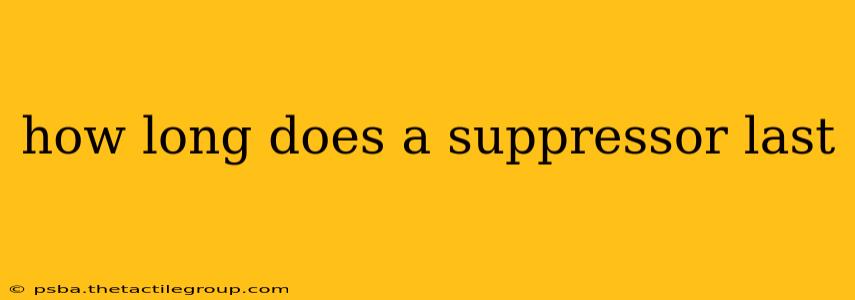The lifespan of a suppressor, also known as a silencer, is a question frequently asked by firearm enthusiasts and newcomers alike. The simple answer is: it depends. There's no single number that accurately reflects the lifespan of every suppressor, as various factors significantly influence its longevity. This article will explore these factors, provide realistic expectations, and offer guidance on maximizing your suppressor's lifespan.
Factors Affecting Suppressor Lifespan
Several key elements determine how long your suppressor will remain effective and reliable:
1. Material and Construction:
- Stainless Steel: Generally considered the most durable material, stainless steel suppressors are resistant to corrosion and high temperatures. They typically offer the longest lifespan.
- Titanium: Lighter than stainless steel, titanium offers excellent durability but can be more expensive. Its resistance to heat and corrosion is also exceptional.
- Aluminum: Less durable than stainless steel or titanium, aluminum suppressors are often lighter and more affordable, but their lifespan may be shorter, especially under heavy use.
The suppressor's construction also plays a crucial role. A robustly built suppressor with high-quality welds and components will naturally outlast a less meticulously crafted one.
2. Caliber and Use:
Larger calibers (e.g., .308 Winchester) generate significantly more heat and pressure than smaller calibers (e.g., .22 LR). This increased stress accelerates wear and tear, potentially shortening the suppressor's lifespan. The frequency and intensity of use also matter. A suppressor used frequently for high-volume shooting will degrade faster than one used occasionally for target practice.
3. Cleaning and Maintenance:
Regular cleaning and maintenance are paramount to extending a suppressor's life. Accumulated carbon buildup, fouling, and corrosive residues can significantly accelerate internal erosion and damage baffles, negatively impacting performance and longevity. Following the manufacturer's recommended cleaning schedule and using appropriate cleaning solvents are vital.
4. Environmental Conditions:
Exposure to extreme temperatures, humidity, and harsh environments can accelerate corrosion and degradation. Proper storage in a dry, controlled environment is crucial for maintaining the suppressor's integrity.
Realistic Expectations for Suppressor Lifespan
While some manufacturers claim a suppressor's lifespan to be essentially indefinite with proper care, a more realistic timeframe is to consider the effective lifespan. This refers to the period during which the suppressor maintains optimal performance and sound suppression.
For most suppressors, used under normal conditions with regular cleaning and maintenance, an effective lifespan of several thousand rounds is reasonable. However, factors discussed above can significantly influence this. Heavy use with larger calibers could reduce this figure. On the other hand, careful use and maintenance of a high-quality suppressor can easily extend this lifespan considerably.
Maximizing Your Suppressor's Lifespan: Practical Tips
- Follow the Manufacturer's Instructions: Adhere to the manufacturer's recommendations for cleaning, maintenance, and storage. This is crucial for maintaining the suppressor's warranty and optimal performance.
- Regular Cleaning: Develop a consistent cleaning routine. Clean your suppressor after each shooting session, especially when firing larger calibers or in adverse conditions.
- Proper Storage: Store your suppressor in a dry, controlled environment away from extreme temperatures and humidity.
- Inspect Regularly: Periodically inspect your suppressor for any signs of damage, such as cracks, dents, or corrosion. Address any issues promptly.
- Use Quality Ammunition: Avoid using ammunition that's known to produce excessive fouling or corrosive residues.
Conclusion
The lifespan of a suppressor isn't a fixed number; it's highly dependent on various factors. By understanding these factors and following proper maintenance procedures, you can significantly extend the life and optimal performance of your suppressor, ensuring years of reliable and effective use. Remember, consulting your suppressor's manufacturer's guidelines is paramount for ensuring the longest possible lifespan.

